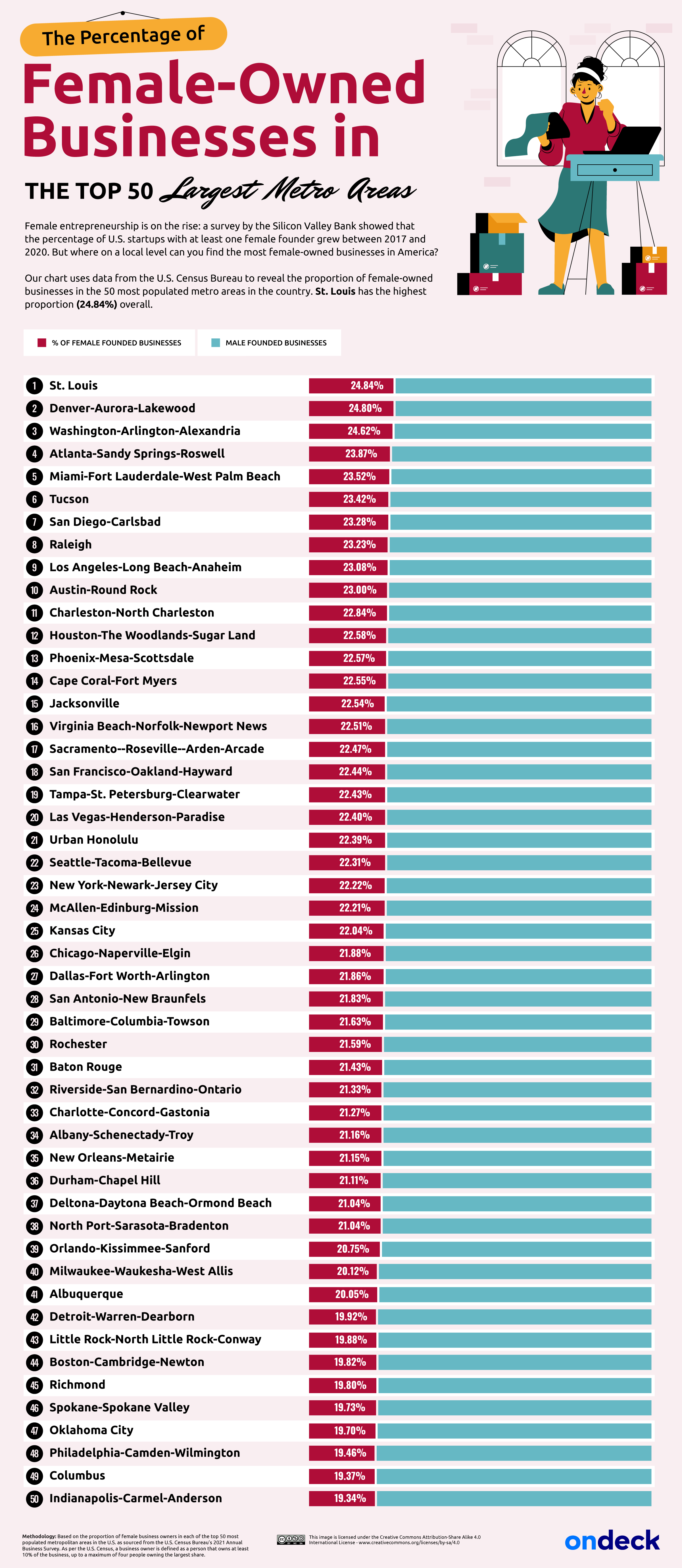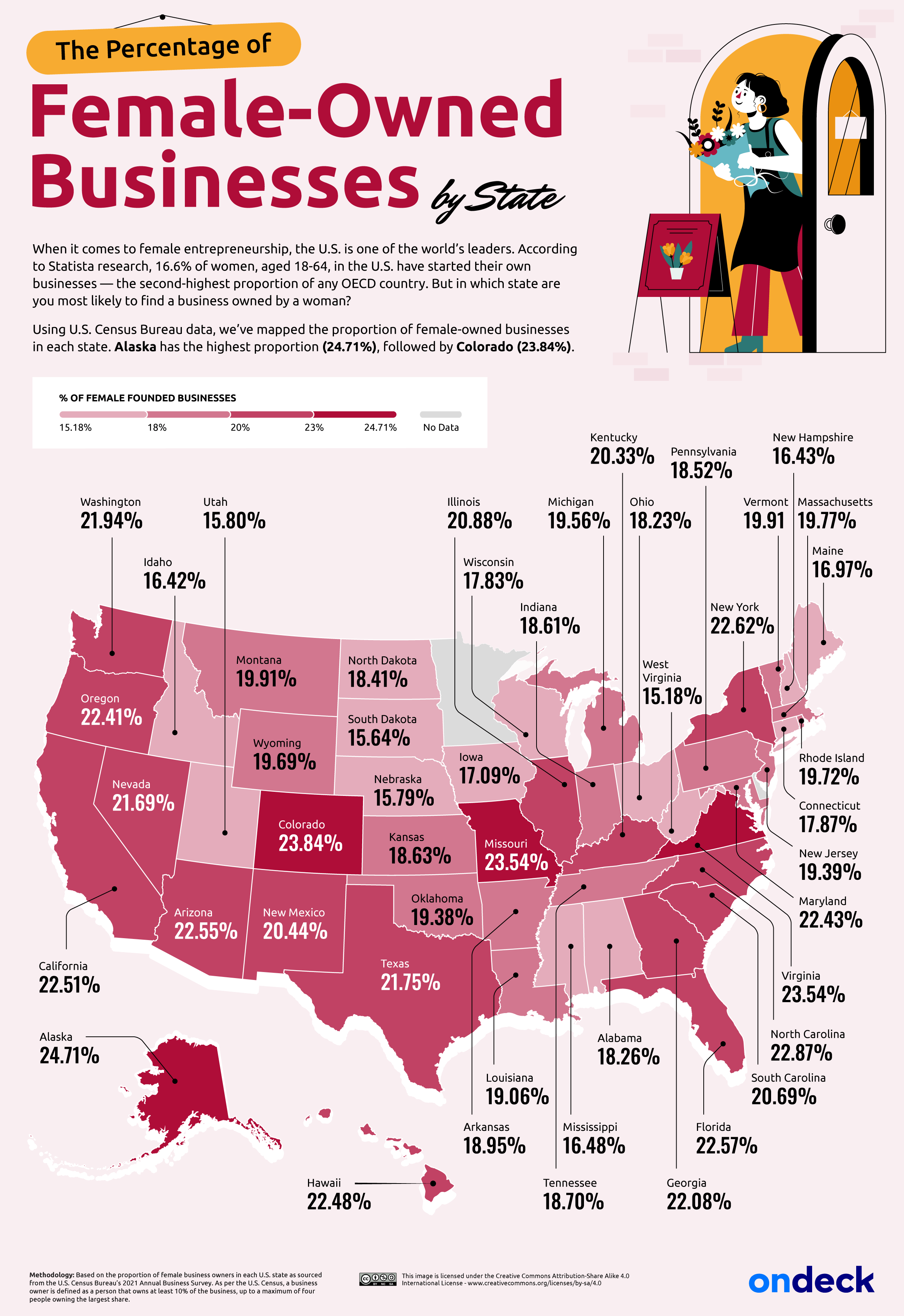Rocking the Foundations: The U.S. States and Metro Areas With Highest Percentage of Female-Owned Businesses

Owning your own business is the epitome of the American Dream. The freedom of self-employment and control of your own income is an allure for many, a feeling shared by 9.6 million people across the country, according to the Bureau of Labor Statistics (BLS).
Yet for generations of women, it was an unattainable goal. Until 1988, a spouse or male relative was needed to co-sign a loan application, and the glass ceiling of the workplace extended to entrepreneurship. This changed when Congress signed the Women’s Business Ownership Act, the first piece of legislation to recognize the contribution of female entrepreneurs to the U.S. economy.
Today, America has one of the best track records when it comes to female entrepreneurship. Research from Mastercard in 2019 ranked the U.S. as the best country in the world at empowering female-led businesses, and other research backs this up; in 2021 almost half (49%) of new ventures were created by female founders. With business thriving across America, which cities and states are home to the most female-owned companies?
What We Did
OnDeck has analyzed U.S. Census Bureau data for more than 300,000 organizations in every major city and state to find out which proportion of business owners in every state and metropolitan area are owned by women. To be classified as an owner a person needs to own at least 10% of a business.
Key Findings
● The highest proportion of female-owned businesses in the U.S. can be found in the St. Louis Metro Area, Missouri, where 24.84% of registered companies are founded by women, according to the U.S. Census Bureau’s 2021 Annual Business Survey.
● A higher % of female-founded organizations are located in Alaska (24.7%) than any other U.S. state, closely followed by Colorado (23.8%).
● Just 14.8% of businesses in Salt Lake City are owned by women — the lowest proportion of any urban area in America.
St. Louis Leads the Way For Female-Owned Organizations
Entrepreneurial activity around the world, particularly for women, has been sluggish as a result of the COVID-19 pandemic. The Global Entrepreneurship Monitor reported a 15% decline in female-led initiatives between 2019 and 2020. Yet this does not paint the full picture for women-owned companies across America, particularly in major cities.

Click here to see the image in full size
One such place is St. Louis, Missouri. Our research shows that the Midwest city and wider metropolitan area has the highest proportion of female-owned businesses in the country, with 24.84% of organizations owned by a woman. The Riverfront City has a reputation for female entrepreneurship, with a Seek Capital study identifying more than 2,700 women-owned startups earning a combined revenue of $150-500m.
St. Louis is closely matched by Denver, Colorado — as our research shows that 24.80% of businesses in the Mile-High City have female owners. A local CBS News survey in 2020 found that 56% of women struggled to maintain their businesses through the depths of the COVID-19 pandemic. Still, Denver’s city council has responded with a new $637K entrepreneurship center aimed at empowering startups led by women and ethnic minorities.
Almost a Quarter of Alaska’s Businesses Are Owned By Women
While America’s major population centers support female-owned businesses with local business initiatives and commerce groups, which of the 50 states are organizations most likely to be owned by women?

Click here to see the image in full size
Alaska is one state punching above its weight when it comes to female entrepreneurship. Despite having both the third-smallest GDP and labor force in the U.S., our analysis shows that 24.71% of its businesses are owned by women — the highest proportion of any state.
A 2018 report by the Center for Economic Development found Alaska’s high proportion of female-owned firms drives economic growth in the state, with 15% posting revenues of $1 million or more. In 2022, the Small Business Administration (SBA) opened a Women’s Business Center to boost the state’s economic activity — the last of all 50 states for one to open.
Less than 15% of Companies in Salt Lake City Are Female-Owned
Though cities like St. Louis and Denver are making progress, the nation’s capital has the country’s third-best track record with gender equality in entrepreneurship. Our research shows that 24.62% of ventures in Washington, D.C., have female owners. Their businesses have come from city institutions, and a 2018 American Express study named the area among the ten best cities for economic growth among women-owned organizations.

Click here to see the image in full size
Not every city is making the same strides, however. Salt Lake City, Utah, has the fewest female-owned businesses in the country, with just 14.81% of companies owned by women. While Utah Governor Spencer Cox argues that more can be done on an administrative level to support women in business and politics, a white paper from the Utah Women and Leadership Project argues Utah must find a way to improve its gender equality record, calling for support to open 1,000 new female-owned businesses in the state.
Are Women-Owned Businesses Thriving in America?
Female entrepreneurship has come a long way since the restrictive days of needing a man to co-sign a business loan. Today’s support and freedom of establishment make it easier than ever to start your own venture. But are women in your area taking advantage of opportunities and starting their own businesses?
You can find our full research below and analysis of the U.S. Census Bureau’s 2021 Annual Business Survey, including where your state and metropolitan area ranks among its neighbors for gender equality in business ventures owned by women.
Our analysis shows that female ownership accounts for less than 25% of all business ownership across every U.S. city or state. So why are women still underrepresented in commerce? A McKinsey report on women highlights both gender and racial disparities in the wider workplace despite women demanding more from their employers.
Yet these same struggles are found in self-employment. Though one in five businesses in the U.S. is female-owned, they receive just 2% of all venture capital funding from investors. Undoubtedly the COVID-19 pandemic set entrepreneurs back, yet BLS data shows that women were disproportionately affected — leading to many describing the downturn as a ‘shecession.’
However, there are more positive signs ahead. Research from the Global Entrepreneurship Monitor in 2022 highlights that women now run a third of the world’s high-growth companies. Also, Pitchbook analysis of investments shows that a record $40.4 billion of funding was raised across 2,661 deals by female-led initiatives.
Methodology
We used the U.S. Census Bureau’s 2021 Annual Business Survey to retrieve the total number of business owners and, specifically, female business owners, as well as the population number in each U.S. state and metropolitan area.
As per the US Census, a business owner is defined as a person that owns at least 10% of the business, up to a maximum of four people owning the largest share.
We calculated the percentage proportion of female business owners within each geographical location’s total number of business owners. We then ranked U.S. states and the top 50 most populated U.S. metros by the percentage of female business owners. Delaware and Minnesota are excluded from our analysis due to insufficient data.
Our data was collected in December 2022.
Disclaimer: In some instances, OnDeck uses the terms “woman” and/or “women” to describe (in this case) business founders whose sex assigned at birth was female, whether they currently identify as female, male or non-binary. When describing or referencing research produced by other organizations, OnDeck uses the gender terminology reported by the original study investigators.
DISCLAIMER: This content is for informational purposes only. OnDeck and its affiliates do not provide financial, legal, tax or accounting advice.
Find the right funding for your business.
Term loans up to $250K. Lines of credit up to $100K.
No obligations and no hard credit pulls.

